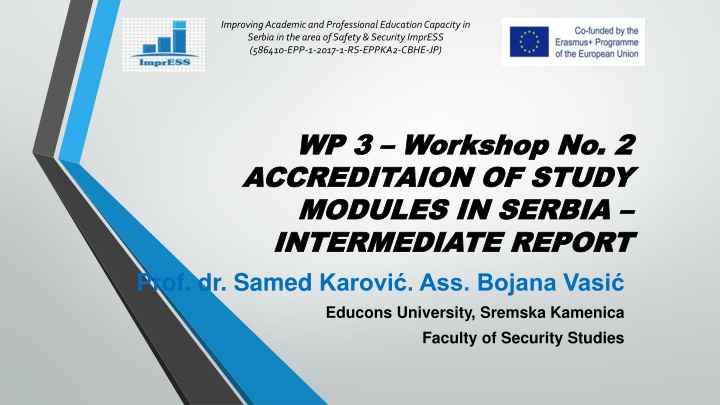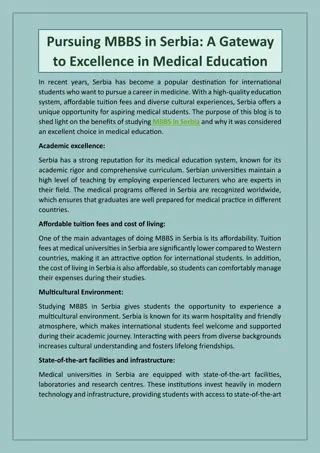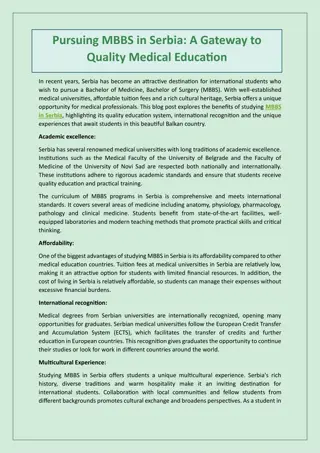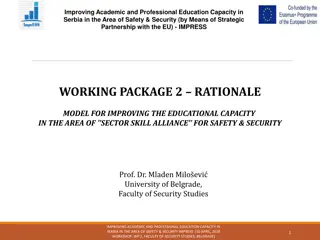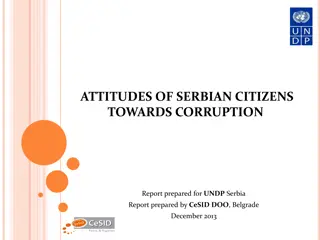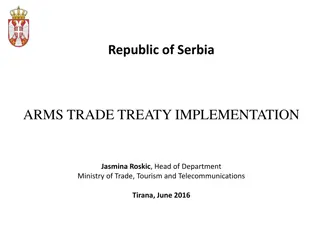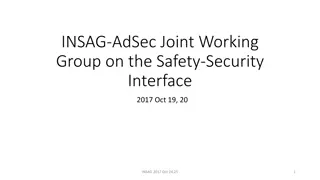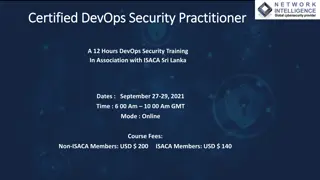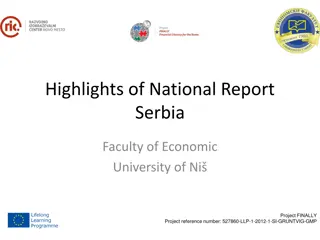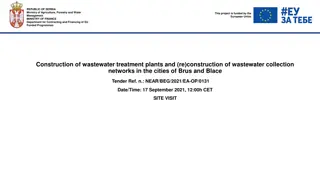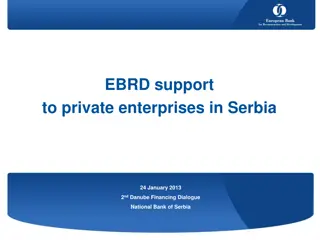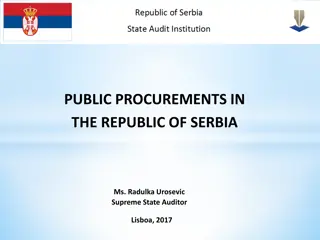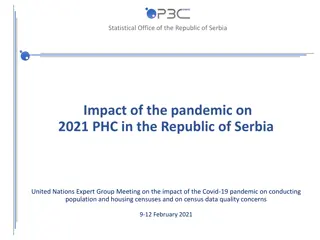Enhancing Safety & Security Education Capacity in Serbia
This project focuses on improving academic and professional education in Safety & Security in Serbia through the development and accreditation of study modules. The Faculty of Security Studies offers Specialist Applied Studies in Security Risk Assessment, with mandatory and elective modules covering various aspects of risk management and security practices. Collaborations with other universities enhance the educational scope to address modern security challenges in areas like environmental safety, personal and business security, and risk in engineering.
Download Presentation

Please find below an Image/Link to download the presentation.
The content on the website is provided AS IS for your information and personal use only. It may not be sold, licensed, or shared on other websites without obtaining consent from the author.If you encounter any issues during the download, it is possible that the publisher has removed the file from their server.
You are allowed to download the files provided on this website for personal or commercial use, subject to the condition that they are used lawfully. All files are the property of their respective owners.
The content on the website is provided AS IS for your information and personal use only. It may not be sold, licensed, or shared on other websites without obtaining consent from the author.
E N D
Presentation Transcript
Improving Academic and Professional Education Capacity in Serbia in the area of Safety & Security ImprESS (586410-EPP-1-2017-1-RS-EPPKA2-CBHE-JP) WP 3 WP 3 Workshop No. 2 Workshop No. 2 ACCREDITAION OF STUDY ACCREDITAION OF STUDY MODULES IN SERBIA MODULES IN SERBIA INTERMEDIATE REPORT INTERMEDIATE REPORT Prof. dr. Samed Karovi . Ass. Bojana Vasi Educons University, Sremska Kamenica Faculty of Security Studies
Content Faculty of Security Studies (Specialist Applied Studies) UCIPS (in collaboration with the University of Defence ) Educons (master and PhD studies) Belgrade Metropolitan University (innovation of 2 courses)
SPECIALIST APPLIED STUDIES SECURITY RISK ASSESSMENT (Title: Security Risk Assessment Specialist) mandatory + elective module + final paper Mandatory module: 1. Sociology of risk 2. Law and Corporate Security 3. Decision making in crisis management (ATRISC) 4. Risk management systems
SPECIALIST APPLIED STUDIES SECURITY RISK ASSESSMENT Elective module: Student selects one module with all the subjects in it. Module 1: Security risk management 1. Risk assessment and planning in modern corporations 2. Business Continuity Activities in Industry and Organization (ATRISC) 3. Social Networks in Crisis and Disaster Management (ATRISC) Module 2: Occupational and environmental safety 1. Environmental safety regulatory framework 2. Safety and health at work 3. Health, Safety, and Environmental Risks (Steinbeis University Berlin or Yonian University)
SPECIALIST APPLIED STUDIES SECURITY RISK ASSESSMENT Elective module: Student selects one module with all the subjects in it. Module 3: Personal and business security 1. Assessment of security risks in ICT systems 2. Protection of personal data 3. Protection of classified information and trade secrets Module 4: Risk in Engineering - Inspection access 1. Introduction to Risk Management (Steinbeis University Berlin) 2. Risk management of pressure vessels 3. Risk assessments in inspection supervision
SPECIALIST APPLIED STUDIES SECURITY RISK ASSESSMENT Elective module: Student selects one module with all the subjects in it. Module 5: Qualitative and quantitative approaches to risk management 1. Risk management methods 2. Sustainability Performance Measurement and Safety Cost Analysis (Sant'Anna School of Advanced Studies) 3. Business Communication and Management of Intercultural Differences (Steinbeis University Berlin)
SPECIALIST APPLIED STUDIES SECURITY RISK ASSESSMENT - application for accreditation
UNIVERSITY OF CRIMINAL INVESTIGATION AND POLICE STUDIES Subject Title: Basic Framework for Accreditation of the Bilingual (Serbian and English) Study Program, in collaboration with the University of Defence (Risk Management in Safety, Security and Defence). Mandatory Courses: 1. Research Methodology in Safety, Security and Defence 2. Elective course 1 (Choose 1 of 12) 3. Elective course 2 (Choose 1 of 12) 4. Elective course 3 (Choose 1 of 12) 5. Elective course 4 (Choose 1 of 12) 6. Elective course 5 (Choose 1 of 12) 7. (Applied) Study Research work 8. Professional practice 9. Master Thesis Total ECTS credits: 60
UNIVERSITY OF CRIMINAL INVESTIGATION AND POLICE STUDIES Elective Courses: 1. Risk Management (in Crisis Management) (The Main School of Fire Service) 2. Modelling of Threats (The Main School of Fire Service) 3. Public Health Oriented Risk Analysis (Steinbeis University Berlin) 4. Geospatial Information in risk assessment (The Main School of Fire Service) 5. Occupational Safety and Health* (Steinbeis University Berlin) 6. Data analytics and decision making (Ionian University, Greece) 7. Project Management in operations in the S&S (Steinbeis University Berlin) 8. Logistics for Crisis Management 9. Critical communications in crisis operations (The Main School of Fire Service) 10. Chemical Biological Radiological Nuclear Risk Management 11. Safety Management of Databases 12. Simulations of cyber attacks (on computer network) and protection methods / Cyber-attack simulations and security management of computer networks / Management of cyber-attack protection against computer networks * The name is likely to be changed
EUDOCNS UNIVERSITY Master studies Mandatory Courses: 1. Methodology of scientific research work 2. Civil protection 3. Terrorism and organized crime 4. Elective course 1 (Choose 1 of 2) 5. Elective course 2 (Choose 1 of 2) 6. Elective course 3 (Choose 1 of 2) 7. Research work 8. Professional practice 9. Master Thesis Total ECTS credits: 60
EUDOCNS UNIVERSITY Master studies Elective course 1: 1. Industrial safety 2. Emergency Situations Elective course 2: 1. Energy security 2. Quantitative Risk Assessment and Advanced Applications / Quantitative methods for risk assessment (Steinbeis University Berlin) Elective Course 3: 1. Decision theory 2. International law
EUDOCNS UNIVERSITY PhD studies First year Mandatory courses: 1. Integrated security systems 2. Methodology of Security Sciences 3. Elective course 1 (Choose 1 of 2) 4. Elective course 2 (Choose 1 of 2) 5. Elective course 3 (Choose 1 of 2) Total ECTS credits: 60
EUDOCNS UNIVERSITY PhD studies First year Elective course 1: 1. Energy and geopolitics 2. Emergency Security Elective course 2: 1. Data analytics and decision making / Decision making systems (or tools) (Ionian University, Greece) 2. Modern methods and techniques of intelligence work Elective course 3: 1. Security Project Management 2. Environmental safety
EUDOCNS UNIVERSITY PhD studies Second year Mandatory courses: 1. Elective course 4 (Choose 1 of 2) 2. Elective course 5 (Choose 1 of 2) 3. Elective course 6 (Choose 1 of 2) 4. Preparation and defence of the doctoral dissertation project 5. Research and publication of papers Total ECTS credits: 60
EUDOCNS UNIVERSITY PhD studies Second year Elective course 4: 1. Management in safety organizations (Sant Anna School of Advanced Studies) 2. Collective security systems Elective course 5: 1. Globalization 2. Relation with stakeholders and communication in disaster / Communication in crisis and disasters (Sant Anna School of Advanced Studies) Elective course 6: 1. Complex Systems Theory, Managing Risks in Complex Systems / Complex systems theory and risk management (Steinbeis University Berlin) 2. Bioterrorism
EUDOCNS UNIVERSITY PhD studies Third year Mandatory courses: 1. Doctoral dissertation - Study research work 1 2. Doctoral dissertation - Study research work 2 3. Doctoral Dissertation - Preparation and Defence of Doctoral Dissertation Total ECTS credits: 60
Belgrade Metropilitan University will not accredit new study module. Instead, it will introduce new study courses Cybersecurity with blockchain Information security
Belgrade Metropolitan University Study programme: Information security Course title: CS545 Cybersecurity with blockchain Lecturer: Nemanja Zdravkovi , Assistant Professor Course status: Mandatory ECTS: 8 Requirement: IT381 Information security, or a similar course Course aims The goal of CS545 Cybersecurity with blockchain is to familiarize the students with the concepts of blockchain technology in the context of data security, current Internet security landscapes and policies, modern computer system vulnerabilities and attacks. The course enables the student to identify security issues regarding the use of blockchain technology, using methods and mechanisms for preventing security attacks and data protection. Course outcomes The topics covered on this course include: Distributed systems and blockchain technology, consensus mechanisms used by blockchain, smart contracts, symmetrical cryptography, asymmetrical cryptography, blockchain and the Internet of Things, current types of system security attacks, the cybersecurity ecosystem, the blockchain security triad confidentiality, integrity, availability, public key infrastructure (PKI), authentication with blockchain, blockchain-based DNS platform, deploying blockchain-based DDoS protection. The student of this course will gain the basic knowledge in the current cybersecurity ecosystem, and familiarize with the concepts of cyber vulnerabilities and their categorization, basic elements of blockchain technology and the concepts of smart contracts, blockchain security, public key infrastructure, and the applying blockchain technology in the context of cyber-attack prevention. Course content Theory classes This 15-week course uses the following Body of knowledge: Curriculum Guidelines for Post-Secondary Degree Programs in Cybersecurity, Version 1.0, December 31st, 2017, The Joint Task Force on Computing Curricula Association for Computing Machinery (ACM) IEEE Computer Society (IEEE-CS), Association for Information Systems Special Interest Group on, Information Security and Privacy (AIS SIGSEC), International Federation for Information Processing Committee on Information Security Education (IFIP WG 11.8), as well as The Cyber Security Body Of Knowledge, Bristol Cyber Security Group, University of Bristol. Practice classes Practice classes consist of individual exercises where students cover the weekly topics from the Course Plan.
Belgrade Metropolitan University Type and level of studies: Master studies Title of the study program: Information security Course title: CS535 Ethics and data privacy Teacher/s: Sini a Domazet Course status: Compulsory Number of ECTS: 8 Prerequisite: No Course objective: The aim of this course is to introduce students to the fundamental legal and ethical standards related to the protection of personal data, and training for professional work in the field of protection against abuse of citizens' personal data and sensitive business data, legal or ethical and social aspects of software development. After passing the exam, students will be able to understand the basics of law and legal protection of personal and business data, legal, ethical and social aspects of software development, legislation related to cyber-crime and cyber law, ethical and legal aspects of data security, as and the basic aspects of cyber policy and the right to privacy. Course outcome (gained knowledge): Understanding the basics of the legal system of the Republic of Serbia, intellectual property rights and cyber law. Also, students will be able to master the process of adopting legal acts in the Republic of Serbia, as well as the manner in which the digital contracts concluded. In addition, the learning outcome of the course is to understand the basic ethical and social postulates in creating software. Finally, the outcome of learning objects and solutions is to overcome the positive-law legislation in the Republic of Serbia in the field of trade secrets, confidential information, access information of public importance, as well as cyber crime. Theoretical work 1. Basics of Law 2. Basics of the legal data protection, 3. Ethical, social and legal aspects of software development, 4. Legal and ethical aspects of security, 5. Organizational security, legal and ethical aspects, 6. Cyber Crime, 7. Cyber Law, 8. Cyber ethics, 9. Law and ethics in relation to data security, 10. Ethics and conflict, 11. Cyber policy, 12. Privacy, 13. Legal framework for the protection of personal data in the enterprise, 14. Basics of Intellectual Property Rights, 15. Digital contracts Practical work Exercises relating to cases of ethical and legal practices, and case studies related to data protection.
THANK YOU FOR YOUR ATTENTION!
